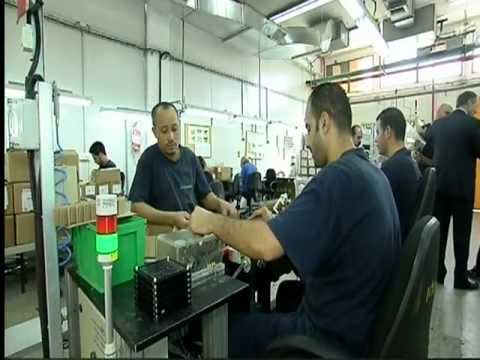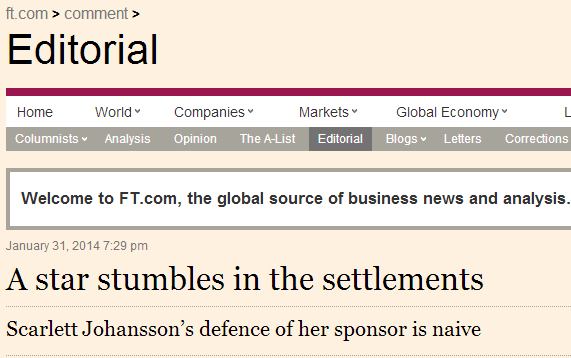Yaacov Lozowick recently quipped that “the Israeli-Arab conflict famously makes many otherwise reasonably normal people lose their marbles”, and a recent Financial Times (FT) editorial (behind pay wall) is more evidence that even the putatively sophisticated often unravel when encountering any Israeli presence on the ‘wrong side’ of the 1949 armistice lines.
The FT writes:
The decision by actress Scarlett Johansson to stop being an ambassador for Oxfam, the social justice charity, and continue as brand ambassador to SodaStream, an Israeli company that makes home-carbonated drink dispensers at a plant in the occupied West Bank, might be dismissed as a storm in a fizzy cup. It should not be.
The Lost in Translation star has accidentally turned a searchlight on an important issue – whether it is right or lawful to do business with companies that operate in illegal Israeli settlements on Palestinian land – as well as inadvertently sprinkling stardust on the campaign to boycott Israel until it withdraws from the occupied West Bank and Arab East Jerusalem – a separate issue, at least so far.
First, the SodaStream factory is located in an industrial park within greater Ma’ale Adumim and, even according to Peace Now, only 0.5% of the settlement territory was built on Palestinian land. Additionally, while the fate of the disputed territory will be decided by negotiations between the two parties, it’s important to note that Ehud Olmert’s generous offer to Mahmoud Abbas in 2008, which included a contiguous Palestinian State in 93% of the West Bank, included Ma’ale Adumim as part of Israel.
Further, the phrase “Arab East Jerusalem” is of course a misnomer, as the only time “East Jerusalem” was ‘Arab’ (that is, 100% Jew-free) and separated arbitrarily between “East” and “West” in its entire history was between 1949 and 1967, the short period when Jordan controlled that part of the city (after expelling all the Jews).
The FT editorial continues with this flourish:
It is disingenuous to romanticise settlement enterprises. The occupation imprisons thousands of the Palestinians’ young men, gives their land and water to settlers, demolishes their houses and partitions the remaining territory with scores of checkpoints and segregated roads.
In addition to the fact that such risible prose is nearly indistinguishable from what’s typically found at hate sites like Mondoweiss and Electronic Intifada, the distortions and obfuscations are remarkable. First, what “imprisons thousands of Palestinians young men” is not “the occupation” but (assuming this is a reference to security prisoners) rather, their own premeditated acts of terror against Israeli citizens – violence for which Palestinians bear sole responsibility.
Additionally, those advancing the myth of settlers stealing Palestinian water – definitively refuted by several reputable sources – always neglects to mention that the water quota for the West Bank was mutually agreed upon in the Oslo accords, and that Israel has in fact consistently supplied more water to the PA than required. Further, contrary claims made to the contrary, the difference in per capita consumption of water between Israeli settlers and Palestinians is actually negligible.
Also, note the claim regarding “segregated roads”, an allusion perhaps to the canard – retracted by multiple media outlets over the years due to the work of CAMERA – of so-called ‘Jews-only roads’. There are no such racially segregated roads in the West Bank, or anywhere in Israel.
The FT editorial concludes thus:
There are almost no basic foundations for an economy. The way to create Palestinian jobs is to end the occupation and let Palestinians build those foundations – not to build “bridges to peace” on other people’s land without their permission.
This is a truly strange passage, suggesting it seems that, much like Oxfam, editors at the FT would rather see 500 Palestinians lose their jobs than countenance the existence of any Jewish presence in Judea and Samaria.
Perhaps FT editors could have spoken to SodaStream employees like Ahmed Nasser, who was quoted in Ha’aretz recently boasting that she “can bring a million [other Palestinians] who want to work here,” or to Journalist Josh Mitnick who visited the SodaStream factory and noted that “SodaStream workers and local Palestinians were downright peeved when asked about the efforts of solidarity activists and their own government to boycott SodaStream”.
As Yaacov Lozowick concluded about the row:
In any other context, worldwide, a private company maintaining a factory in an underdeveloped country so as to take advantage of its lower labor costs would be regarded as a boon for the hosting country (if perhaps not for the rich country the factory had previously been in). SodaStream, however, isn’t paying hundreds of Palestinian workers what they’d get from a Palestinian employer. It’s paying the Palestinian laborers Israeli wages, with the social benefits mandated by Israeli law….If ever there is peace between Israel and Palestine, Israeli owned factories in Palestine employing Palestinians is precisely the sort of thing everyone should be wishing for.
The Financial Times, it should be noted, is the British equivalent of the U.S.-based Wall Street Journal, focused primarily on business and financial news, and in any other context the paper would presumably be lauding a case like SodaStream (the largest private company employing Palestinians in the West Bank) as a textbook example of the kind of foreign direct investment championed by economists and international development advocates.
However, as Lozowick observed, when it comes to the Israeli-Palestinian Conflict, normal discourse and rational thought often devolve into agitprop, hyperbole and activist-inspired platitudes.










